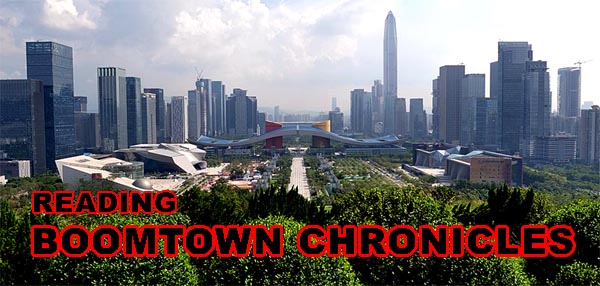 |
| Shenzhen, the Boomtown (Wikipedia) |
Note: Between Lesson #01-128 and #01-207, I wrote 72 lessons explaining expressions in articles published in the Shenzhen Daily. Read more about "Reading Boomtown Chronicles."
Get Ready: What's your favorite catchphrase from a movie or television show?
Boomtown Chronicles Part V - published Monday, July 14, 2008 (cont.)
- Shekou was "a potential ocean shipping hub."
hub: the central portion of a wheel, with the spokes radiating out from it. A hub, then, is the center point from which things, like shipping or transportation, radiate outward.
- Yang Geng "received the go-ahead" from Central Government officials
go-ahead: approval, or "greenlight." Here, a verb and an adverb--"go" and "ahead"--become a noun. Because it's fairly recent, "go-ahead" still has a hyphen. But some older examples, like "a startup business" or "a turnaround specialist," have dropped the hyphen and become a single word.
- The Shekou Industrial Zone was "one of the cradles of the country's modern industrial boom."
cradle: a special bed to hold a baby. So the "cradle" of something is the place where it began. For example, the area of the Middle East where cities first developed is called "the cradle of civilization."
- Yuan Geng coined an expression, "Time is money, efficiency is life." The article states, "The catchphrase, which would seem bland and self-evident these days...rocked the country and soon attracted salvos from conservatives who said it was a brazen advocacy of capitalism."
Here are five interesting terms from this sentence:
--------catchphrase: an expression like a slogan (or a buzzword!) which catches people's attention
bland: tasteless, plain, even boring, like white sandwich bread
rocked: the image is like the results of a bomb or other blast; a major impact
salvos: The word "salvo" is related to "safe"; it was originally a round of gunfire used to hail or greet a dignitary; later it came to be used in reference to any assault with guns or explosives. Here it is figurative, of course.
brazen: Actually meaning "made of brass," it was used to refer to someone who put on a face without emotion, incapable of showing shame, like a face of brass. Thus it has come to mean "bold" or "impudent."
Read more: https://en.wikipedia.org/wiki/Shenzhen
Practice: Choose the correct term to fill in the blank in the sentence below:
- bland
- brazen
- catchphrase
- cradle
- go-ahead
- hub
- rocked
- salvos
- As soon as the accountant gave the ________, the construction team began the building.
- The university had served as a research ________ for many years, and was responsible for a lot of great discoveries.
- Joe's proposal was a ________ attempt to take over the project.
- What this advertising campaign needs is a good ________.
- Even though he was very knowledgeable, the agent's presentation was so ________ that everyone stopped paying attention.
- The CEO's death ________ the company's management, and they had to scramble to deal with the sudden change.
- After the initial media ________, the student protest settled down and they began a long, quiet sit-in.
- Some people consider Italy to be the ________ of opera.
Answers are in the first comment below.
Submitted to the Shenzhen Daily for July 24, 2008


Answers to the Practice: 1. e; 2. c; 3. d; 4. h; 5. a; 6. b; 7. f; 8. g
ReplyDelete